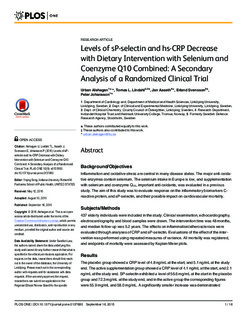| dc.description.abstract | Background/Objectives Inflammation and oxidative stress are central in many disease states. The major anti-oxidative enzymes contain selenium. The selenium intake in Europe is low, and supplementation with selenium and coenzyme Q10, important anti-oxidants, was evaluated in a previous study. The aim of this study was to evaluate response on the inflammatory biomarkers C-reactive protein, and sP-selectin, and their possible impact on cardiovascular mortality. Subjects/Methods 437 elderly individuals were included in the study. Clinical examination, echocardiography, electrocardiography and blood samples were drawn. The intervention time was 48 months, and median follow-up was 5.2 years. The effects on inflammation/atherosclerosis were evaluated through analyses of CRP and sP-selectin. Evaluations of the effect of the intervention was performed using repeated measures of variance. All mortality was registered, and endpoints of mortality were assessed by Kaplan-Meier plots. Results The placebo group showed a CRP level of 4.8 ng/mL at the start, and 5.1 ng/mL at the study end. The active supplementation group showed a CRP level of 4.1 ng/mL at the start, and 2.1 ng/mL at the study end. SP-selectin exhibited a level of 56.6 mg/mL at the start in the placebo group and 72.3 mg/mL at the study end, and in the active group the corresponding figures were 55.9 mg/mL and 58.0 mg/mL. A significantly smaller increase was demonstrated through repeated measurements of the two biomarkers in those on active supplementation. Active supplementation showed an effect on the CRP and sP-selectin levels, irrespective of the biomarker levels. Reduced cardiovascular mortality was demonstrated in both those with high and low levels of CRP and sP-selectin in the active supplementation group. Conclusion CRP and sP-selectin showed significant changes reflecting effects on inflammation and atherosclerosis in those given selenium and coenzyme Q10 combined. A reduced cardiovascular mortality could be demonstrated in the active group, irrespective of biomarker level. This result should be regarded as hypothesis-generating, and it is hoped it will stimulate more research in the area | nb_NO |

